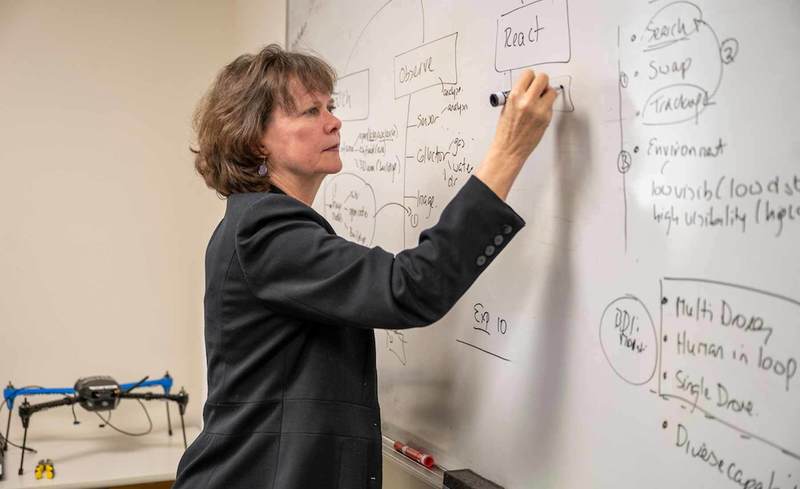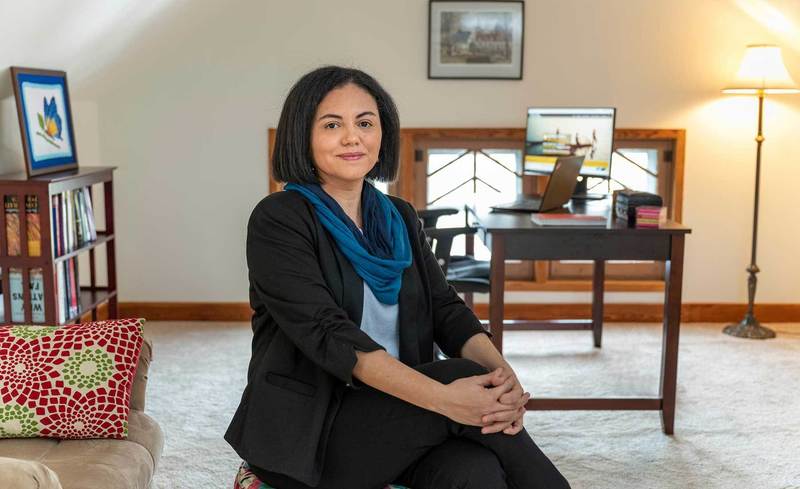A Measure of Personality
Lee Anna Clark
College of Arts and Letters
William J. and Dorothy K. O'Neill Professor of Psychology

Lee Anna Clark remembers the moment that set the course for her career.
She was pursuing her doctorate in psychology at the University of Minnesota when the first detailed diagnostic system for personality pathology was published in the Diagnostic and Statistical Manual of Mental Disorders’ third edition.
She looked at it and thought — that’s not right.
It was a step forward for the DSM, considered the definitive handbook in the U.S. for diagnosing mental disorders, to address personality pathology. But Clark believed it needed to take a more comprehensive view of personality traits. And she began working to find a better way.
Four decades later, Clark is a world-renowned research psychologist whose work has been cited more than 100,000 times.
“I have always believed you can’t treat something until you know how to measure it.”
The William J. and Dorothy K. O’Neill Professor of Psychology has dedicated her career to the assessment of personality pathology and has served on the personality and personality disorders working group for the DSM’s fifth edition and, most recently, the 11th edition of the International Classification of Diseases (ICD) — the World Health Organization’s global standard for coding health information.
“I have always believed you can’t treat something until you know how to measure it,” she said. “So I’ve spent my career figuring out how to measure this. And that’s why the ICD project is so exciting to me — it’s essentially the model I envisioned in graduate school, with much more sophistication, decades later.
“It’s very satisfying to know that I at least played some part in it.”
A love for languages
When Clark began her undergraduate education at Cornell University, she didn’t imagine she would one day be changing the world of research psychology.
After spending a summer in Japan during high school, she came to Cornell with a passion for languages and cultures and designed her own major in psycholinguistics.
“It was the stories about people’s languages that always fascinated me,” she said. “The stories about accents and word usages and how people use language in different ways in different subcultures. I loved the combination of the complexity of language and its application to individuals.”
She then taught English in Japan for several years before returning to Cornell to teach Japanese and complete a master’s degree in Asian studies. But she felt something was missing.
“I began to think, is this what I really want to do for the rest of my life?” she said. “The thing I loved about psychology was its focus on the whole person, the way that all the different parts of people interact to make them who they are. It’s that richness that I liked. So I decided to go back to psychology and thought, somehow, I could still use my language skills.”

Charting a new course
She was admitted to a clinical psychology graduate program at the University of Minnesota to work with a mentor focused on cross-cultural psychology and translating measures into different languages — including the Minnesota Multiphasic Personality Inventory (MMPI), one of the most widely used industry tools.
Clark was awarded a Fulbright Student Award to Japan and focused her dissertation on completing a Japanese version of the MMPI.
“That was when I finally brought those two pieces of my life together,” Clark said. “And then when the DSM-III came out, I became fascinated with the personality disorder side of it and just ran with it. But it came full circle again with my most recent work on the ICD.”
Because the ICD is an international manual, Clark worked with colleagues from Serbia, Iran, Nigeria, Argentina, Korea, Italy and New Zealand, among others, to create a text that is culturally relevant and accessible to a worldwide audience — including those countries with very few mental health professionals.
“In low-to-middle-income countries, most people will never see a mental health specialist,” she said, “so the ICD provides for diagnosis on different levels. On the most basic level, it is designed to identify the most severe cases that are in need of immediate treatment, because many countries do not have the resources to treat everyone.”
Personality disorders are particularly important to diagnose, Clark noted, because the disorder is associated with high personal, interpersonal and societal costs — including an increased risk of suicide and approximately a 10-year-shorter life expectancy than average.
“People with personality disorders experience problems in the workplace, in their relationships and in their own sense of identity,” she said. “Treatment can be challenging, but it is crucial. When a person with personality pathology moves from being unhealthy to healthy, their core personality doesn’t change — they just learn how to make it work for them instead of against them.”

Mentoring the next generation
In addition to her work on the DSM and ICD, Clark has also developed the Schedule for Nonadaptive and Adaptive Personality, a psychological test that measures personality traits across the healthy-pathological spectrum, and together with her husband, David Watson, the Andrew J. McKenna Family Professor of Psychology at Notre Dame, designed the Positive And Negative Affect Schedule, a simple but effective test to measure mood.
She and Watson joined the Notre Dame faculty from the University of Iowa in 2010 and co-direct the Center for Advanced Measurement of Personality and Psychopathology Lab. Clark was drawn to Notre Dame’s collaborative atmosphere, she said, as well as to the chance to help shape the Department of Psychology’s clinical program, which was being launched at the time.
“The idea of helping to build something from the ground up was exciting, and we decided to give it a whirl,” Clark said. “Now, the program has been through its second accreditation with the American Psychological Association and we’re in the process of developing our own in-house clinic and training and research center. We’re hoping to expand and develop that further, and then we’ll turn it over to the next generation to really see it through to fruition.”
“I am proud that I have become someone in the field who younger women can come to for advice. It’s just so nice to know that you have affected the lives of other women.”
Clark has recently received several lifetime achievement awards in recognition of her work and her mentorship, including the Society for Personality and Social Psychology’s Jack Block Award for Distinguished Contributions to Personality, the Society for Research in Psychopathology’s Joseph Zubin Award for Lifetime Contributions to Psychopathology and its John Neale Sustained Mentorship Award, and the John Gunderson Senior Researcher Award by the International Society for the Study of Personality Disorders.
Although she has never felt that being a woman negatively affected her career, she has seen it affect others, and mentoring female students and junior faculty members has been especially important to her.
“The sustained mentorship award is one of the most precious awards I’ve received,” she said. “I’ve never limited myself to mentoring only my own graduate students, and I am proud that I have become someone in the field who younger women can come to for advice. It’s just so nice to know that you have affected the lives of other women.”
Other Stories







